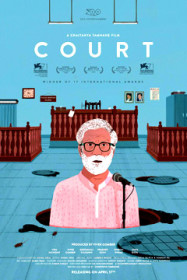by Soumyadeep Chatterjee
Even before I had actually clicked on the video icon of my YouTube app, I knew Chaitanya Tamhane’s Court was going to be a different experience. All the praises that I had heard and the fact that the film was India’s official submission for the 88th Oscars, sort of prepared me for a good courtroom drama. However, I must admit here that having grown up feeding on Bollywood courtroom dramas and lesser-known Bengali films surrounding court cases, I had certain preconceived expectations from the film: there would be a bad guy, a good guy, and the bad guy would have implicated the good one. There would be two lawyers, one for the good guy who would also be good, and the other one for the bad guy would be a stereotype villainous character. Oh, there would be the mighty, fair, unbiased, unquestionable judge who will pass the correct judgement, after holding back his pen momentarily, in the last moment, from penning the wrong verdict, courtesy the last-minute entry of a pivotal character with the case-changing evidence. And there would be a happy ending, where everyone righteous will be acquitted. End of case….
Fortunately for Indian cinema, I was wrong. As it turned out, I was in for a surprise. Because Court has a courtroom drama, without the usual drama shown in the depictions of our judicial temples by Indian films. In fact, the lack of anything startling may seem to render a slowness to the plot to impatient audiences. Thankfully, I was not such an audience. Because Court is an experience that needs to be cherished with patience, understood with careful observance.
Narayan Kamble (played by Vira Sathidar) is a folk singer/activist who is arrested on the charge that his song incited and provoked a manhole worker to commit suicide. As trivial and unbelievable as it may sound, the matter is taken extremely seriously by the authorities. His trial, and the various components of that trial form the crux of the film. However, to say that the film is only about this trial would be grossly suppressing the real protagonist of the film. Which brings me to the next doubt that came up in my head, fifteen minutes into the film: whose story was the film trying to tell?
Initially I thought it was the story of Narayan Kamble. Then, after a few minutes, I felt the story belonged to the defense lawyer (played by Vivek Gomber, who is also the producer). I saw a person genuinely interested in fighting for the rights of the people, I saw an idealist. So, was he the main character? No, now it seemed the public prosecutor(played beautifully by Geetanjali Kulkarni) was also a claimant to being the center of the story. Also, here the public prosecutor is not a villain as I initially was estimating! The public prosecutor is a woman putting in tremendous effort to balance both household and work, a situation common to numerous working women in India. Interestingly, she is not a pawn of some vengeful authority trying to turn the case against the folk-singer. She is a public prosecutor doing her job, and she certainly adds a different angle to the film. At one point, the focus shifts to the manhole worker’s wife. Through her character, the director shows how unaffecting things become for people who have always been deprived, that even the worst possible things are narrated with the utmost casual tone and approach. Something to think about.
The characters of the two lawyers are diametrically opposite. While one is an English-proficient young man trying to make the right point in his fight with the judicial system, the other is an ordinary middle-class character with all the daily troubles and difficulties every such person has to face. They conduct their duties in different ways, for altogether diverse motivational factors. Yet, at some point, the two characters seem to overlap. The young man also has to look after a family and although the responsibility is not the same as that of the woman, the obstacles are similar. At the same time, the middle-class woman has to handle her household duties, but that does not stop her from conducting her professional duties. A completely different psychological element comes to play in the portrayal of the judge (played by Pradeep Joshi), who enters the picture only towards the end. He who decides the future of all the accused in the judicial system, can himself be temperamental and perceptive at times.
Eventually, one realises whom the film’s story is being told for. Not the accused, not the lawyers, not even the judge. In fact, they all are parts of that one complex entity, as evident in the film’s name and in turn in the entire film itself – Court. The film does complete justice to its name by depicting nothing except the court.
Chaitanya’s direction is grounded in reality, almost documentary-style. The director is never preachy, he does not try to impose any views on us. He just shows what happens and leaves the judging bit to us. The actors have all done a commendable job, particularly Gitanjali Kulkarni, who has brought a certain dignity to the character of the public prosecutor. The cinematography is simplistic, yet effective, best shown in one scene where Vivek Gomber’s character is ruffed up in front of a restaurant, and the camera never pans towards the ruckus. Instead sitting steady, it focuses on the entrance of the restaurant, and the audience can just hear the shouts and scream, but cannot see what exactly is happening. Simple, yet effective. The editing slightly affects the pace, but perhaps that was needed for a film like this.
For me, this film shattered all the stereotypes that I had about our judicial system. I now know, the seemingly orthodox and anti-liberal public prosecutor can be more liberal than the other characters, in a subtle and simple way. I now know, that fighting for rights can be a daunting task, even if you come from a well-established family. I now know, that judges are not super-humans who are above all possible stimulants of loss of temperament, and that they too, like any other human, can thrash a child for waking him up from a peaceful slumber. I now know, like I had after watching Kurosawa’s ‘Rashomon’, that the establishment of truth in cases of judicial matters depends on the fickle perceptions of the minds involved in the decision-making process.. And yes, I also know that courts do give ‘tareekh pe tareekh’, but in the real world, venting out one’s anger on that is more difficult than often shown in films.
As the penultimate scene of Court shows, people in the courtroom start leaving as vacation commences, and the judgement on the case gets delayed, like it has always happened. In the end, all that remains is the dilapidated skeleton of the structure known by the name, Court. Devoid of light and people, and devoid of justice too perhaps, in some cases.






